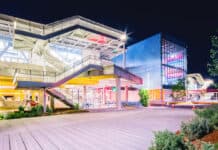Walmart’s diverse set of on-site and off-site solar has kept the company in the top 5 for the last decade.
“Solar energy is a key part of Walmart’s commitment to become a regenerative company, powered by 100% renewable energy by 2035,” said Vishal Kapadia, senior vice president, energy transformation at Walmart. “Our onsite and offsite solar projects have helped us deliver strong progress toward our goal, with 46% of our global electricity needs supplied by renewable energy as of 2021.”

Companies including Intel, Google, Switch and Digital Realty are using solar energy at data center facilities, which help to power critical information and data infrastructure. In addition, food and beverage giants like Ab Inbev and Starbucks, healthcare companies like Kaiser Permanente and DaVita, and other top brands like Home Depot and T-Mobile are all top 25 corporate solar users.
“We are honored to be recognized for our on-site solar generation efforts,” said Susan Uthayakumar, Chief Energy and Sustainability Officer at Prologis. “This is only the beginning as we work toward our goal of 1 gigawatt of solar by 2025. We’ve long been an industry leader in solar. It’s an area we have and continue to invest in for two reasons — it makes good business sense, and it is good for the planet.”
There are now 23 U.S. companies that have installed at least 100 MW of solar capacity, up from 11 companies in 2019. Of the top 25 companies ranked in the report, 18 are pursuing 100% renewable energy or carbon neutral goals. The full report tracks over 47,000 corporate solar installations nationwide, which combined generate enough electricity to power 3.2 million homes and offset 20.4 million metric tons of carbon annually.
“As the world’s largest temperature-controlled industrial REIT and logistics solutions provider, Lineage Logistics has dedicated itself to limiting our impact on the environment as we play a crucial role in the global food supply chain,” said Chris Thurston, Director of Energy and Sustainability at Lineage Logistics. “As we live out our purpose of eliminating food waste and helping to feed the world, we are proud of our team’s efforts to do so in a way that will have a positive impact on our planet. Our hope is that the findings from the Solar Means Business report motivate other companies to adopt solar energy usage and join the effort of ensuring future generations will have a cleaner, healthier planet.”
How Community Solar Can Help Achieve ESG Goals
 Community solar uses government programs to incentivize large solar projects which historically required major capital and space investments.
Community solar uses government programs to incentivize large solar projects which historically required major capital and space investments.The report also tracks commercial solar projects that are paired with battery storage, which is useful for businesses that provide essential services or supply critical information or data infrastructure.
The report predicts that total commercial solar installations will double again over the next three years, with nearly 27 GW of off-site corporate solar projects scheduled to come online by 2025. This represents nearly a third of the total contracted solar pipeline.




















![[VIDEO] Collect Asset Data at the Speed of Walking a Building](https://facilityexecutive.com/wp-content/uploads/2024/02/maxresdefault-324x160.jpg)